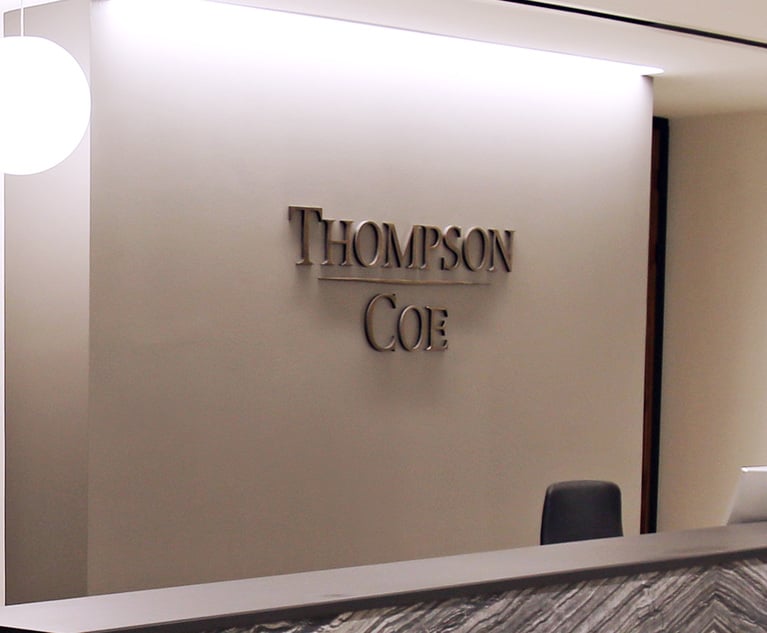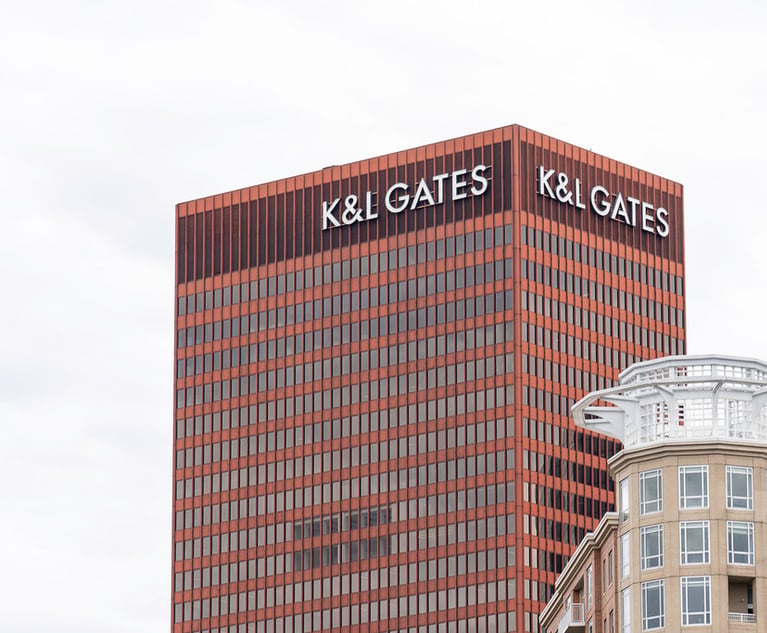U.S. Firms Are Drawn to Singapore Despite the Barriers to Entry
Singapore is an attractive location for foreign law firms—but not an easy one.
September 05, 2019 at 02:00 PM
4 minute read
The original version of this story was published on Law.com
 Credit: Weerasak Saeku/Shutterstock.com
Credit: Weerasak Saeku/Shutterstock.com
Cooley recently announced it is opening a fourth Asian office in Singapore. Once approved by local authorities, Cooley will join some 130 foreign law firms in the city-state. The firm just opened a Hong Kong office in March.
Singapore has been on many minds lately because of Hong Kong, where occasional protests have now turned quotidian and violent. For the first time in a long while, people are concerned with the overall stability of Hong Kong as unrest persists. Nobody is leaving Hong Kong right away over the protests, but people seem to be considering their options.
But Singapore is by no means an easy market for foreign law firms. While Hong Kong has a more open and liberalized legal market, Singapore keeps a strictly regulated regime of foreign lawyers. On paper, both jurisdictions require foreign law firms to cooperate with local firms in giving local law advice. But the barriers to entry are different.
In Hong Kong, the requirement of a local alliance is more or less a formality. Firms are free to operate an associate firm of their own choosing from the outset.
In Singapore, firms have a menu of options, and it's exceedingly more complicated. Currently, there are at least four different ways foreign firms can access local law practice, and all are subject to lengthy regulatory scrutiny. Nine firms now operate as qualifying foreign law practices, which allows for limited practice of Singaporean law, mostly in transactions but not litigation and conveyancing. The QFLPs have long been criticized for a review process that requires firms to meet a variety of quotas they set for themselves in order to obtain their licenses. Last year, the government had to postpone license renewal for firms such as Jones Day and Gibson, Dunn & Crutcher after they failed to deliver what they promised.
More firms prefer to operate either a joint law venture or a formal law alliance with local firms. Both programs give unlimited access to local law practice. But for those aiming for an integrated practice, these approaches don't naturally lead to a merger; so far, U.K. firm Withers is the only one that has managed to combine with its formal law alliance partner firm.
Mergers didn't exist in Singapore until 2015, when Morgan, Lewis & Bockius combined with Stamford Law Corp. The deal between Eversheds Sutherland and local firm Harry Elias was the first combination of two existing offices in Singapore, and the entire process, including regulatory filings, took two years to work out.
Some argue there is no need to localize or practice local law in Singapore. U.S. firms with strong Singapore practices, such as Shearman & Sterling and Milbank have done so without local law practice. Unlike in Hong Kong, where local law practice is essential to matters related to the Hong Kong Stock Exchange, most foreign firms in Singapore handle cross-border transactions and international arbitration and have minimal need for local law practice. This also has to do with the strong group of local firms in Singapore hat for years have dominated the premium local law work in cross-border deals and top domestic matters.
For its new Singapore office, Cooley has hired Ferish Patel, a U.S. lawyer advising startups on cross-border financing deals. His previous firm, Gunderson Dettmer Stough Villeneuve Franklin & Hachigian, secured some of the largest regional mandates three years after launching in the city-state, with no Singapore law practice. Local law or not, Singapore isn't any less competitive than Hong Kong. It may be an alternative, but it's challenging in its own ways.
Email: [email protected]
This content has been archived. It is available through our partners, LexisNexis® and Bloomberg Law.
To view this content, please continue to their sites.
Not a Lexis Subscriber?
Subscribe Now
Not a Bloomberg Law Subscriber?
Subscribe Now
NOT FOR REPRINT
© 2025 ALM Global, LLC, All Rights Reserved. Request academic re-use from www.copyright.com. All other uses, submit a request to [email protected]. For more information visit Asset & Logo Licensing.
You Might Like
View All
KPMG Wants to Provide Legal Services in the US. Now All Eyes Are on Their Big Four Peers



K&L Gates Sheds Space, but Will Stay in Flagship Pittsburgh Office After Lease Renewal
Trending Stories
- 1'It's Not Going to Be Pretty': PayPal, Capital One Face Novel Class Actions Over 'Poaching' Commissions Owed Influencers
- 211th Circuit Rejects Trump's Emergency Request as DOJ Prepares to Release Special Counsel's Final Report
- 3Supreme Court Takes Up Challenge to ACA Task Force
- 4'Tragedy of Unspeakable Proportions:' Could Edison, DWP, Face Lawsuits Over LA Wildfires?
- 5Meta Pulls Plug on DEI Programs
Who Got The Work
Michael G. Bongiorno, Andrew Scott Dulberg and Elizabeth E. Driscoll from Wilmer Cutler Pickering Hale and Dorr have stepped in to represent Symbotic Inc., an A.I.-enabled technology platform that focuses on increasing supply chain efficiency, and other defendants in a pending shareholder derivative lawsuit. The case, filed Oct. 2 in Massachusetts District Court by the Brown Law Firm on behalf of Stephen Austen, accuses certain officers and directors of misleading investors in regard to Symbotic's potential for margin growth by failing to disclose that the company was not equipped to timely deploy its systems or manage expenses through project delays. The case, assigned to U.S. District Judge Nathaniel M. Gorton, is 1:24-cv-12522, Austen v. Cohen et al.
Who Got The Work
Edmund Polubinski and Marie Killmond of Davis Polk & Wardwell have entered appearances for data platform software development company MongoDB and other defendants in a pending shareholder derivative lawsuit. The action, filed Oct. 7 in New York Southern District Court by the Brown Law Firm, accuses the company's directors and/or officers of falsely expressing confidence in the company’s restructuring of its sales incentive plan and downplaying the severity of decreases in its upfront commitments. The case is 1:24-cv-07594, Roy v. Ittycheria et al.
Who Got The Work
Amy O. Bruchs and Kurt F. Ellison of Michael Best & Friedrich have entered appearances for Epic Systems Corp. in a pending employment discrimination lawsuit. The suit was filed Sept. 7 in Wisconsin Western District Court by Levine Eisberner LLC and Siri & Glimstad on behalf of a project manager who claims that he was wrongfully terminated after applying for a religious exemption to the defendant's COVID-19 vaccine mandate. The case, assigned to U.S. Magistrate Judge Anita Marie Boor, is 3:24-cv-00630, Secker, Nathan v. Epic Systems Corporation.
Who Got The Work
David X. Sullivan, Thomas J. Finn and Gregory A. Hall from McCarter & English have entered appearances for Sunrun Installation Services in a pending civil rights lawsuit. The complaint was filed Sept. 4 in Connecticut District Court by attorney Robert M. Berke on behalf of former employee George Edward Steins, who was arrested and charged with employing an unregistered home improvement salesperson. The complaint alleges that had Sunrun informed the Connecticut Department of Consumer Protection that the plaintiff's employment had ended in 2017 and that he no longer held Sunrun's home improvement contractor license, he would not have been hit with charges, which were dismissed in May 2024. The case, assigned to U.S. District Judge Jeffrey A. Meyer, is 3:24-cv-01423, Steins v. Sunrun, Inc. et al.
Who Got The Work
Greenberg Traurig shareholder Joshua L. Raskin has entered an appearance for boohoo.com UK Ltd. in a pending patent infringement lawsuit. The suit, filed Sept. 3 in Texas Eastern District Court by Rozier Hardt McDonough on behalf of Alto Dynamics, asserts five patents related to an online shopping platform. The case, assigned to U.S. District Judge Rodney Gilstrap, is 2:24-cv-00719, Alto Dynamics, LLC v. boohoo.com UK Limited.
Featured Firms
Law Offices of Gary Martin Hays & Associates, P.C.
(470) 294-1674
Law Offices of Mark E. Salomone
(857) 444-6468
Smith & Hassler
(713) 739-1250










